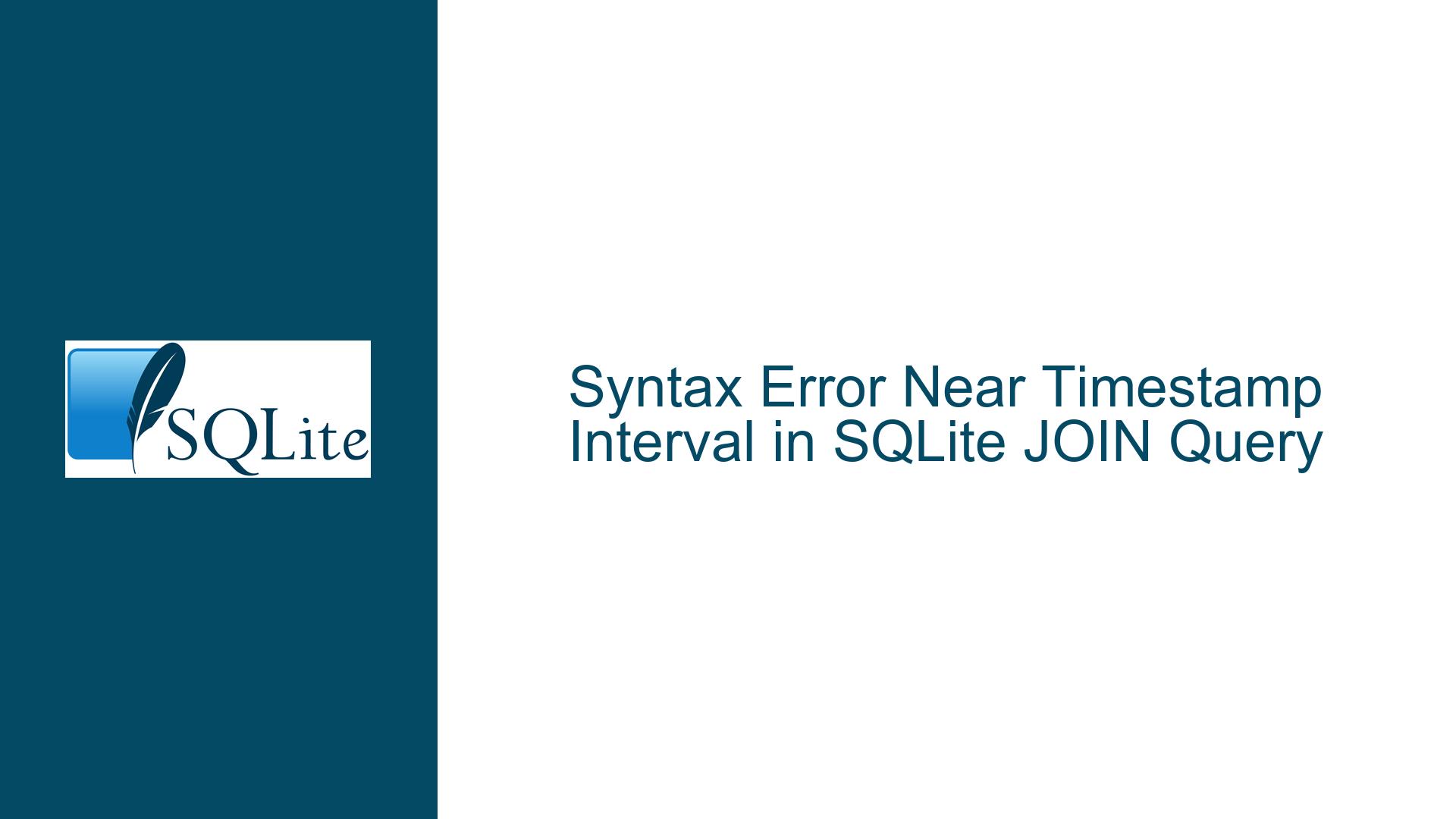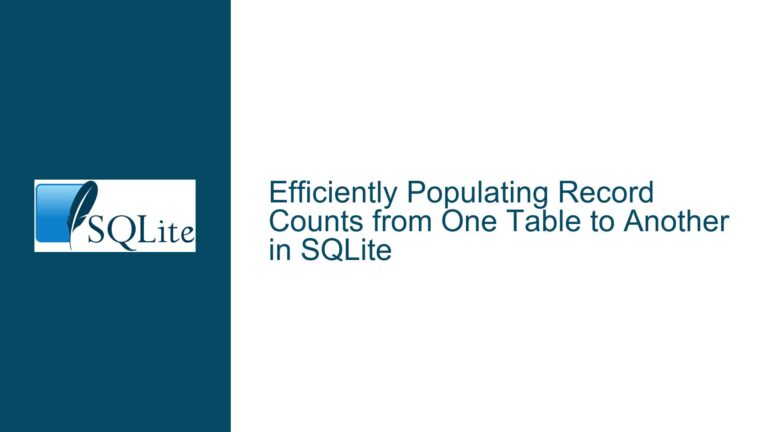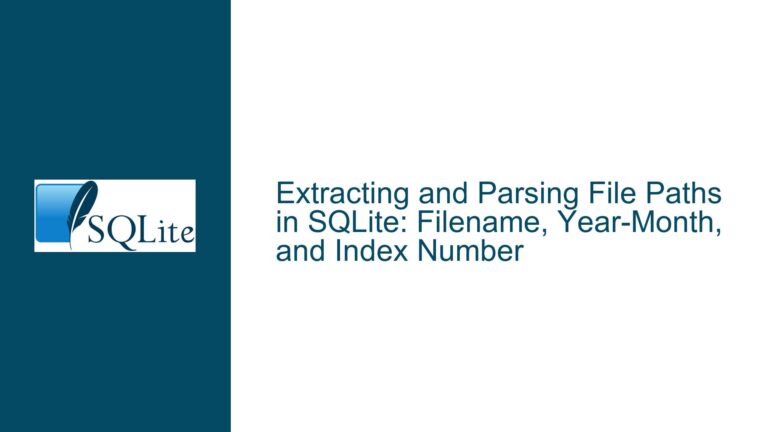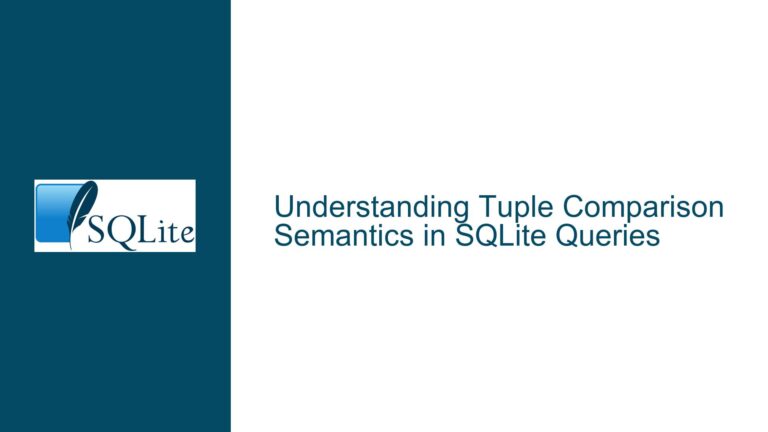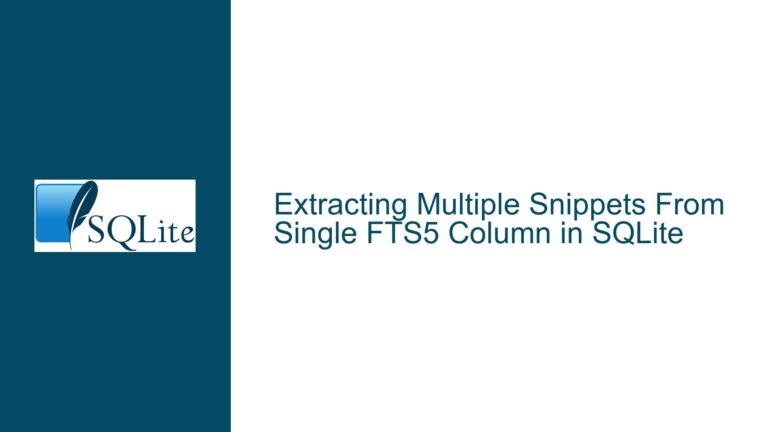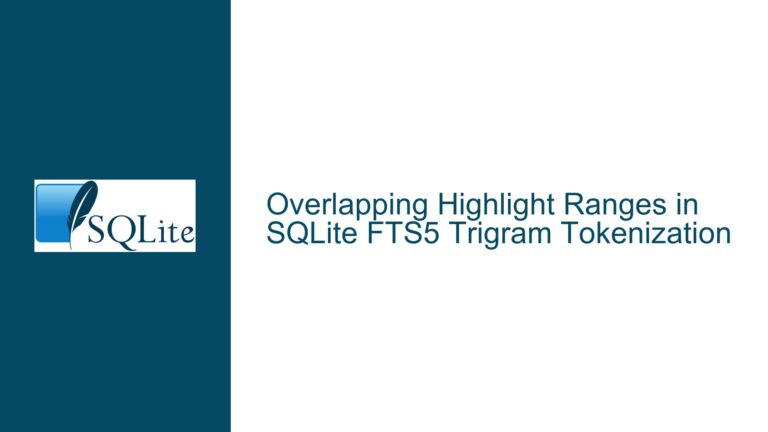Syntax Error Near Timestamp Interval in SQLite JOIN Query
Understanding the Syntax Error in Timestamp Interval Calculations During JOIN Operations
Issue Overview
The core problem revolves around a syntax error triggered during the execution of a SQLite SELECT query involving a LEFT JOIN between two tables (airModules_Event_tracking and FareNet_Searches). The error message explicitly references a syntax issue near !0, but this is a red herring. The actual root cause lies in the improper use of timestamp interval arithmetic within the JOIN conditions. SQLite does not natively support the INTERVAL keyword for date/time manipulations, which leads to parsing failures. Additionally, the query contains a critical typo in a column name (event.Timestamp instead of event_Timestamp), further complicating the error diagnosis. The timestamps in both tables are likely stored in incompatible formats (e.g., Unix epoch vs. ISO-8601 strings), which exacerbates the problem when attempting arithmetic operations.
Root Causes of Syntax and Semantic Errors in Timestamp-Based JOINs
1. Invalid Use of INTERVAL Keyword
SQLite’s date and time functions do not recognize the INTERVAL keyword, which is valid in other SQL dialects like PostgreSQL or MySQL. The parser interprets INTERVAL '10' MINUTE as a syntax error because it expects a numeric literal or a valid expression after the - or + operator. This is a common pitfall for developers transitioning from databases with richer interval support.
2. Column Name Typo (event.Timestamp vs. event_Timestamp)
The query references airModules_Event_tracking.event.Timestamp, but the correct column name is event_Timestamp (with an underscore). This typo introduces a parsing ambiguity: SQLite interprets event.Timestamp as a table alias event with a column Timestamp, which does not exist. The parser then throws a misleading error near !0 due to internal tokenization conflicts.
3. Incompatible Timestamp Storage Formats
The FareNet_Searches.FareNetTimestamp and airModules_Event_tracking.event_Timestamp columns might use different storage formats. For example:
- Unix epoch integers (seconds since 1970-01-01),
- ISO-8601 strings (e.g.,
2023-05-05 03:22:48), - Julian Day numbers.
If arithmetic operations likeevent_Timestamp - INTERVAL '10' MINUTEare attempted without converting these values to a compatible format, SQLite will fail to evaluate the expressions correctly.
Step-by-Step Solutions for Timestamp Interval Errors and JOIN Optimization
Step 1: Replace INTERVAL with SQLite-Compatible Date Modifiers
SQLite’s date/time functions (datetime(), unixepoch(), strftime()) accept modifiers for arithmetic operations. Replace the invalid INTERVAL clauses with modifiers like '-10 minutes'.
Example Fix for ISO-8601 Timestamps:
SELECT
a.EMCid,
a.event_Timestamp,
a.TotalPriceUSD AS ModulePrice,
f.TotalPriceUSD AS SearchResultPrice
FROM
airModules_Event_tracking AS a
LEFT JOIN
FareNet_Searches AS f
ON
a.EMCid = f.EMCid
AND f.FareNetTimestamp >= datetime(a.event_Timestamp, '-10 minutes')
AND f.FareNetTimestamp <= datetime(a.event_Timestamp, '+10 minutes')
ORDER BY
a.EMCid,
a.event_Timestamp DESC;
Example Fix for Unix Epoch Timestamps:
...
AND f.FareNetTimestamp >= unixepoch(a.event_Timestamp, '-10 minutes')
AND f.FareNetTimestamp <= unixepoch(a.event_Timestamp, '+10 minutes')
...
Step 2: Correct Column Name Typos
Ensure all column references match the schema. Use table aliases to avoid ambiguity:
-- Original (incorrect):
airModules_Event_tracking.event.Timestamp
-- Corrected:
airModules_Event_tracking.event_Timestamp
Step 3: Standardize Timestamp Storage Formats
- If timestamps are stored as ISO-8601 strings, use
datetime()for conversions. - If timestamps are Unix epochs, use
unixepoch()or arithmetic directly. - For Julian Day numbers, use
julianday().
Example Conversion for Mixed Formats:
Suppose event_Timestamp is an ISO-8601 string and FareNetTimestamp is a Unix epoch integer:
AND f.FareNetTimestamp >= unixepoch(datetime(a.event_Timestamp, '-10 minutes'))
AND f.FareNetTimestamp <= unixepoch(datetime(a.event_Timestamp, '+10 minutes'))
Step 4: Validate Timestamp Values
Run diagnostic queries to ensure timestamps are in the expected format:
-- Check for valid ISO-8601:
SELECT event_Timestamp FROM airModules_Event_tracking WHERE event_Timestamp NOT LIKE '____-__-__ __:__:__';
-- Check for valid Unix epochs:
SELECT FareNetTimestamp FROM FareNet_Searches WHERE FareNetTimestamp NOT BETWEEN 0 AND 253402300799;
Step 5: Handle Timezone Differences
If timestamps include timezone offsets, standardize them to UTC:
AND f.FareNetTimestamp >= unixepoch(datetime(a.event_Timestamp, '-10 minutes', 'utc'))
Step 6: Index Optimization for JOIN Performance
Create indexes on EMCid and timestamp columns to accelerate the JOIN:
CREATE INDEX idx_airmodules_emcid_time ON airModules_Event_tracking(EMCid, event_Timestamp);
CREATE INDEX idx_farenet_emcid_time ON FareNet_Searches(EMCid, FareNetTimestamp);
Step 7: Edge Case Handling
- NULL Timestamps: Use
COALESCE()to avoid excluding rows with NULLs. - Leap Seconds: SQLite ignores leap seconds, so ensure application-layer handling if required.
Final Optimized Query:
SELECT
a.EMCid,
a.event_Timestamp,
a.TotalPriceUSD AS ModulePrice,
f.TotalPriceUSD AS SearchResultPrice
FROM
airModules_Event_tracking AS a
LEFT JOIN
FareNet_Searches AS f
ON
a.EMCid = f.EMCid
AND f.FareNetTimestamp BETWEEN
unixepoch(datetime(a.event_Timestamp, '-10 minutes'))
AND
unixepoch(datetime(a.event_Timestamp, '+10 minutes'))
ORDER BY
a.EMCid,
a.event_Timestamp DESC;
By methodically addressing the syntax error sources, standardizing timestamp formats, and optimizing the query structure, developers can resolve the interval-related JOIN failures and ensure robust timestamp comparisons in SQLite.
